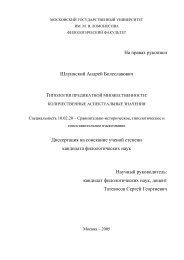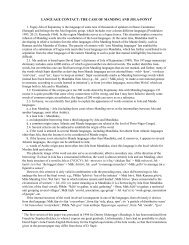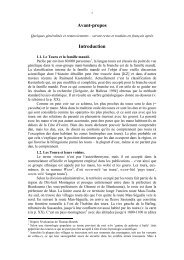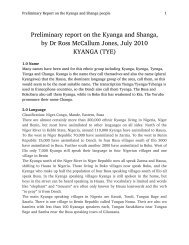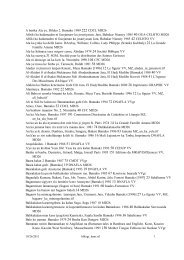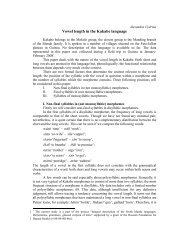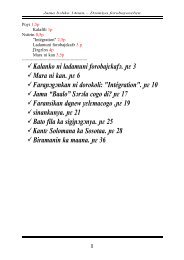South Mande Reconstruction: Initial consonants1 - Langues mandé ...
South Mande Reconstruction: Initial consonants1 - Langues mandé ...
South Mande Reconstruction: Initial consonants1 - Langues mandé ...
You also want an ePaper? Increase the reach of your titles
YUMPU automatically turns print PDFs into web optimized ePapers that Google loves.
necessary some serious corrections (for a comparative analysis ofGrégoire's paper, see division 3.2.4.).1.2. Since 2000, a considerable change took place. Within the frameworkof the Swiss-Russian joint research project '<strong>Mande</strong> Lexicology' supportedby the Swiss National Foundation of Scientific Research (grantSUBJ 062156.00), a team of Russian researchers and studentsaccomplished six field trips to Côte d'Ivoire working on grammars anddictionaries of nearly all the languages of the <strong>South</strong> <strong>Mande</strong> group. Only apart of the language data collected during the trips has been handled sofar, but even at the current stage, creation of a relatively reliablecomparative database became possible, from which stems the presentedreconstruction of the Proto-<strong>South</strong> <strong>Mande</strong> consonant system.1.3. Before proceeding to the reconstruction, I am going to present ashort survey of the language group and the sources of the language data.A preliminary genetic filiation of the languages of the group is representedon Diagram 1, which is based on my experience of work with theselanguages and needs further elaboration. On this diagram, dotted linesrepresent strong horizontal relationships between languages.Diagram 1. Genetic tree of <strong>South</strong> <strong>Mande</strong> languagesProto-<strong>South</strong> <strong>Mande</strong>Mano Dan Tura Mwan GbanGio Blo Gweeta Kla Wan BengGuroYaure1.3.1. The languages of the <strong>South</strong> <strong>Mande</strong> group, a subbranch of theEastern <strong>Mande</strong> branch of the <strong>Mande</strong> family, are located almost exclusivelyin Côte d'Ivoire. The only exception is Mano, spoken mainly in thenorth of Liberia, plus a small compact area at the extreme <strong>South</strong> of Guinea.I used two language manuals of Mano: [DeZeeuw & Kruah 1981] and[Neal et al. 1946], as well as my modest field notes for the Guinean dialect



